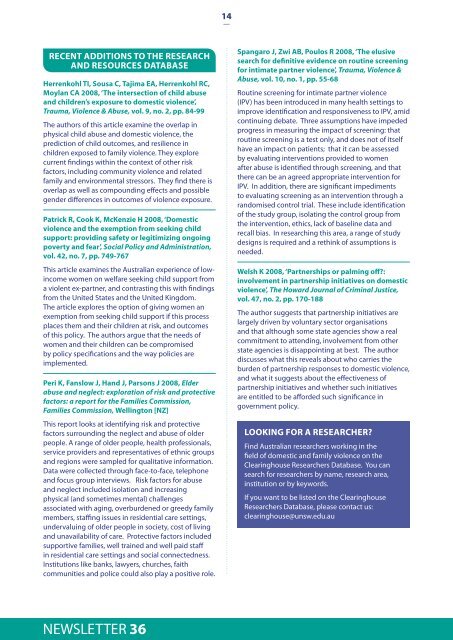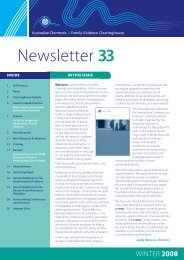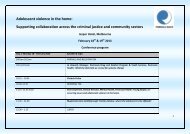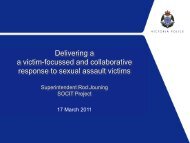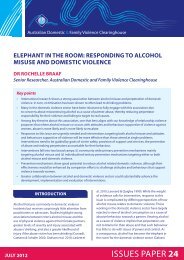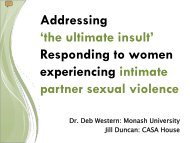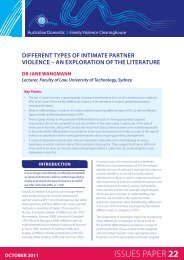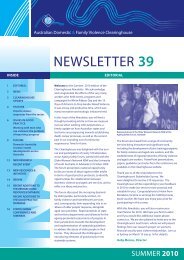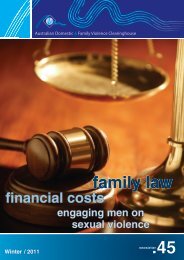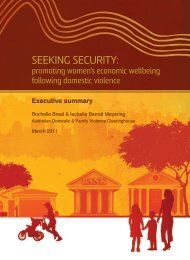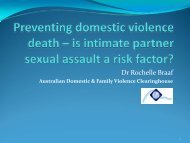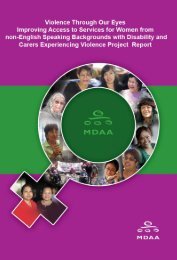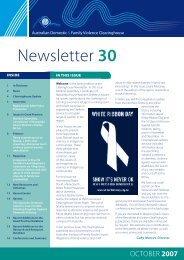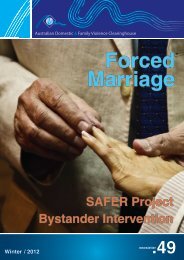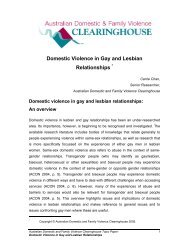newsletter - Australian Domestic and Family Violence Clearing House
newsletter - Australian Domestic and Family Violence Clearing House
newsletter - Australian Domestic and Family Violence Clearing House
Create successful ePaper yourself
Turn your PDF publications into a flip-book with our unique Google optimized e-Paper software.
14<br />
RECENT ADDITIONS TO THE RESEARCH<br />
AND RESOURCES DATABASE<br />
Herrenkohl TI, Sousa C, Tajima EA, Herrenkohl RC,<br />
Moylan CA 2008, ‘The intersection of child abuse<br />
<strong>and</strong> children’s exposure to domestic violence’,<br />
Trauma, <strong>Violence</strong> & Abuse, vol. 9, no. 2, pp. 84-99<br />
The authors of this article examine the overlap in<br />
physical child abuse <strong>and</strong> domestic violence, the<br />
prediction of child outcomes, <strong>and</strong> resilience in<br />
children exposed to family violence. They explore<br />
current findings within the context of other risk<br />
factors, including community violence <strong>and</strong> related<br />
family <strong>and</strong> environmental stressors. They find there is<br />
overlap as well as compounding effects <strong>and</strong> possible<br />
gender differences in outcomes of violence exposure.<br />
Patrick R, Cook K, McKenzie H 2008, ‘<strong>Domestic</strong><br />
violence <strong>and</strong> the exemption from seeking child<br />
support: providing safety or legitimizing ongoing<br />
poverty <strong>and</strong> fear’, Social Policy <strong>and</strong> Administration,<br />
vol. 42, no. 7, pp. 749-767<br />
This article examines the <strong>Australian</strong> experience of lowincome<br />
women on welfare seeking child support from<br />
a violent ex-partner, <strong>and</strong> contrasting this with findings<br />
from the United States <strong>and</strong> the United Kingdom.<br />
The article explores the option of giving women an<br />
exemption from seeking child support if this process<br />
places them <strong>and</strong> their children at risk, <strong>and</strong> outcomes<br />
of this policy. The authors argue that the needs of<br />
women <strong>and</strong> their children can be compromised<br />
by policy specifications <strong>and</strong> the way policies are<br />
implemented.<br />
Peri K, Fanslow J, H<strong>and</strong> J, Parsons J 2008, Elder<br />
abuse <strong>and</strong> neglect: exploration of risk <strong>and</strong> protective<br />
factors: a report for the Families Commission,<br />
Families Commission, Wellington [NZ]<br />
This report looks at identifying risk <strong>and</strong> protective<br />
factors surrounding the neglect <strong>and</strong> abuse of older<br />
people. A range of older people, health professionals,<br />
service providers <strong>and</strong> representatives of ethnic groups<br />
<strong>and</strong> regions were sampled for qualitative information.<br />
Data were collected through face-to-face, telephone<br />
<strong>and</strong> focus group interviews. Risk factors for abuse<br />
<strong>and</strong> neglect included isolation <strong>and</strong> increasing<br />
physical (<strong>and</strong> sometimes mental) challenges<br />
associated with aging, overburdened or greedy family<br />
members, staffing issues in residential care settings,<br />
undervaluing of older people in society, cost of living<br />
<strong>and</strong> unavailability of care. Protective factors included<br />
supportive families, well trained <strong>and</strong> well paid staff<br />
in residential care settings <strong>and</strong> social connectedness.<br />
Institutions like banks, lawyers, churches, faith<br />
communities <strong>and</strong> police could also play a positive role.<br />
Spangaro J, Zwi AB, Poulos R 2008, ‘The elusive<br />
search for definitive evidence on routine screening<br />
for intimate partner violence’, Trauma, <strong>Violence</strong> &<br />
Abuse, vol. 10, no. 1, pp. 55-68<br />
Routine screening for intimate partner violence<br />
(IPV) has been introduced in many health settings to<br />
improve identification <strong>and</strong> responsiveness to IPV, amid<br />
continuing debate. Three assumptions have impeded<br />
progress in measuring the impact of screening: that<br />
routine screening is a test only, <strong>and</strong> does not of itself<br />
have an impact on patients; that it can be assessed<br />
by evaluating interventions provided to women<br />
after abuse is identified through screening, <strong>and</strong> that<br />
there can be an agreed appropriate intervention for<br />
IPV. In addition, there are significant impediments<br />
to evaluating screening as an intervention through a<br />
r<strong>and</strong>omised control trial. These include identification<br />
of the study group, isolating the control group from<br />
the intervention, ethics, lack of baseline data <strong>and</strong><br />
recall bias. In researching this area, a range of study<br />
designs is required <strong>and</strong> a rethink of assumptions is<br />
needed.<br />
Welsh K 2008, ‘Partnerships or palming off:<br />
involvement in partnership initiatives on domestic<br />
violence’, The Howard Journal of Criminal Justice,<br />
vol. 47, no. 2, pp. 170-188<br />
The author suggests that partnership initiatives are<br />
largely driven by voluntary sector organisations<br />
<strong>and</strong> that although some state agencies show a real<br />
commitment to attending, involvement from other<br />
state agencies is disappointing at best. The author<br />
discusses what this reveals about who carries the<br />
burden of partnership responses to domestic violence,<br />
<strong>and</strong> what it suggests about the effectiveness of<br />
partnership initiatives <strong>and</strong> whether such initiatives<br />
are entitled to be afforded such significance in<br />
government policy.<br />
Looking for a researcher<br />
Find <strong>Australian</strong> researchers working in the<br />
field of domestic <strong>and</strong> family violence on the<br />
<strong>Clearing</strong>house Researchers Database. You can<br />
search for researchers by name, research area,<br />
institution or by keywords.<br />
If you want to be listed on the <strong>Clearing</strong>house<br />
Researchers Database, please contact us:<br />
clearinghouse@unsw.edu.au<br />
<strong>newsletter</strong> 36


